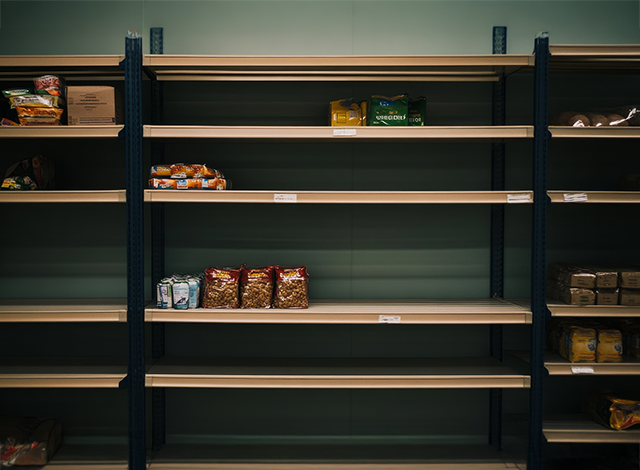LAURIE WEIR
Every month, nearly 1,000 people in Smiths Falls turn to the food bank. This week, town council unanimously declared food insecurity an emergency, citing alarming poverty rates and a growing local crisis.
The motion, advanced during the April 28 committee of the whole meeting, was drafted by the Smiths Falls For All Committee — a group chaired by Mayor Shawn Pankow. Final adoption is expected at an upcoming council meeting.
“This is one of the greatest threats to the health and well-being of our residents,” Pankow said. “Food insecurity has significant consequences on the physical and mental health of all of our citizens. These include increased rates of chronic disease, premature mortality, poor educational outcomes and social well-being.”
The mayor noted that demand for the local food bank has surged, with more than 950 clients per month — a 200 per cent increase in recent years. While the town has contributed more than $200,000 to food security efforts since 2019, Pankow said lasting change will require systemic action from higher levels of government.
“I recognize our ability to make a difference is limited,” he said. “The Ottawa Food Bank has seen usage increase by 90 per cent since 2019. Smiths Falls has seen a much larger increase, closer to 200 per cent. So, there’s no doubt that food insecurity is, unfortunately, on the rise.”
“All of us can see in our daily lives the impact of rising costs,” he added. “This affects everyone, and our residents are struggling. I hope that council’s endorsement will help us take further action and make a statement.”
A public health crisis
The motion is grounded in data shared by Dana Douglas, a registered dietitian and public health nutritionist with the South East Health Unit. Her February presentation revealed that 15.5 per cent of households in Leeds, Grenville and Lanark are food insecure.
According to the committee’s report, 25.8 per cent of Smiths Falls households face affordability issues. Among low-income families, 22 per cent of children under five live in poverty — more than four times the provincial average of 5.3 per cent.
But the evidence isn’t just statistical — it’s visible in real time on local social media platforms, where anonymous posts regularly appear in community groups from residents asking for food, formula, or other basic essentials. Many describe being unable to afford groceries for their children or having to choose between rent and meals.
Coun. Peter McKenna expressed concern about broader economic trends.
“These are really strange times,” McKenna said. “We could be heading into some very dark economic times. Smiths Falls has identified this as a serious issue for our community. Other communities may not be far behind.”
“We’ve been using the charity model to feed people,” he added. “And that’s not sustainable.”
Coun. Jennifer Miller voiced her support and encouraged the public to learn more about the issue. She sees first-hand how this affects families involved in Lanark County Big Brothers and Big Sisters, where she is the executive director.
“I certainly believe we should go ahead with this motion and declare food insecurity an emergency in Smiths Falls,” she said. “As an aside, I also would encourage residents to attend the presentation on basic income being presented at the Station Theatre on May 8 at 7 p.m. I think it will help all of us have a better understanding of one of the ways we can make a real difference.”
What’s next?
The motion calls on the provincial and federal governments to:
- Increase base funding for school food programs;
- Raise social assistance rates to meet the cost of living;
- Implement a Guaranteed Livable Basic Income; and
- Include food insecurity reduction in all appropriate policies and party platforms.
Copies of the resolution will be sent to government leaders, political party heads, municipal organizations and school board associations across the country.
The four priorities
Clerk Kerry Costello introduced the report as part of an interim update on the committee’s work. Originally formed to explore inclusivity and equity, the committee has now refined its focus to four key areas: housing, poverty, food insecurity and inclusivity.
“This group has undertaken a lot of work,” Costello said. “We’ve heard from multiple delegations. We’ve done a public survey … the group has come to terms with our own four priorities.”
Council also supported the committee’s request to update its name to Smiths Falls Equity For All, replacing the former moniker.
What declaring a food insecurity emergency really means
Declaring food insecurity an emergency doesn’t unlock emergency funding or invoke special powers — but it does something powerful.
It sends a clear message: this is no longer just a social issue or a charity concern. It’s a public health crisis rooted in poverty, low wages, and systemic inequality.
By making this declaration, Smiths Falls joins other municipalities in pushing for:
- Long-term policy solutions, not just food drives;
- Increased support for school nutrition programs;
- Social assistance rates that actually reflect the cost of living;
- And a rethinking of how communities — and governments — respond to rising hunger.
It’s also a way to put pressure on senior levels of government that help is needed to fix the problem.















